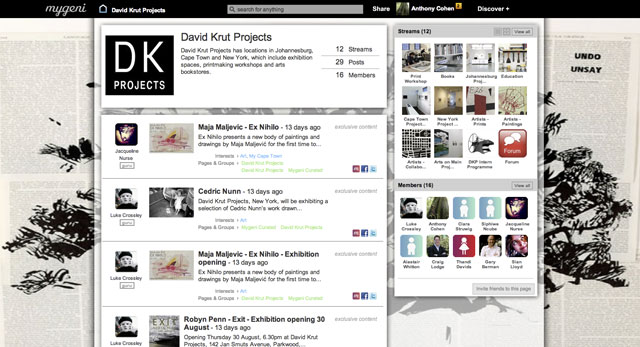
Social content filtering service Mygeni is a self-funded Johannesburg-based start-up created to help people reduce the digital clutter that social networks generate and help brands better connect and engage with their existing databases of customers.
Mygeni founder Anthony Cohen says he had the idea for Mygeni in 2004 but opted to sit on the idea until the “time was right”.
Facebook launched at about the same time, which gave Cohen confidence that his idea would eventually come to fruition.
The start-up was “borne out of frustration of being completely overloaded with information”, Cohen explains. The Internet sometimes looks like it’s solely for the benefit of a “few majors” that “herd us at the information they’re pushing”.
He says the rise of digital-savvy consumers and social media, coupled with the glut of digital information, means communications from brands need to be strictly on an opt-in basis. Social media “spray-and-pray” campaigns, where all content is pushed to all platforms, is increasingly regarded as spam.
“Users must be in charge of the communication they receive, they must opt in, and they need to be able to create custom filters so they only see what they want,” he says. “A brand’s database, like a mailing list, is an asset, but many companies aren’t using it that way.”
Cohen says Mygeni wants to increase engagement using existing databases rather than being used as an acquisition tool itself. Beyond targeting the public to become users, the company is signing up brands to create content for the platform. It’s added almost a dozen since it was launched a fortnight ago.
Those that sign up can create and customise a profile page and establish multiple content streams, each tied to a specific topic. End users can then choose which streams to follow. For example, a sportswear manufacturer could create streams for footwear or running apparel so users would only get the content related to their particular area of interest.
“Mygeni has its own integrated content management system for publishing content and pushes to Facebook and Twitter,” says Cohen.
Facebook, he says, presents problems for both marketers and users. “There’s no content search; content lives only for a few hours before it disappears in a user’s feed, the information is pushed to users rather than being available to them on request, and there’s no categorisation.
“Social media managers have to repost content in new, inventive ways to keep it active and this means a fractured experience because you can’t carry over comments from earlier posts.”
Facebook is capitalising on brands’ own value because companies can’t control what advertisements appear alongside their own brand pages, he adds. “We just got sold for US$120 each on Facebook. Without us, there is no Facebook, but we didn’t see any of that money. There’s a disconnect in the value chain. Your brand generated the interest.”
Mygeni customers can advertise their own portal with free banner ads that only show in relevant streams. For example, a company can create a banner that will only display in the streams of users looking for certain keywords. Customers can also sell ad space on their own page, or use the space for links to their own online store or other portals.

Each brand page also offers a forum to allow users to comment on or post their own content. “We want to separate a brand’s own content from users’ content so the brand message is undiluted and doesn’t get eroded,” says Cohen.
Users can search Mygeni do contextual searches and filter results by their existing relationships. For example, they could search for hotels or restaurants in a particular area or filter the results so they only see relevant information from trusted friends.
Individual users are also ranked from “novice” to “guru” about topics they engage with. “Rank is determined by a user’s number of friends, how many content items they’ve posted and how many times those have been viewed, shared or commented on.”
When posting content, Mygeni users are encouraged to mark the content as original (if it is), and to rate it accordingly. So, for example, a user posting a restaurant review could rate it out of five, add its location to Google Maps, and add images, links or other content.
Cohen says this presents “geospatial possibilities”, particularly for the mobile applications the service will be launching in coming months. “Users can see what friends have recommended on a particular street, for example.”
Initial coding for the service was done in Cape Town. Testing was performed with 1 500 users who created more than 3 400 content items. Cohen says the interface needed to be simplified and so further coding was done, this time in the Ukraine on an outsourced basis.
Brands looking to create a brand page need to apply to Mygeni and be verified before they can begin to post content. Before the various discounts that are applicable to agencies, nongovernmental organisations and strategic partners, a Mygeni page costs R5 950/month.
The service will also take a cut of advertising expenditure on brand pages where it has been instrumental in brokering a deal between the brand and the advertiser. The brand can, however, sell its own advertising on its page exclusively. — (c) 2012 NewsCentral Media

